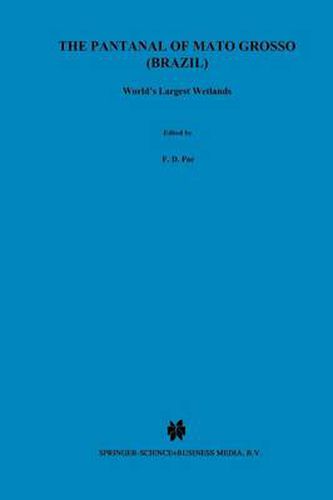Readings Newsletter
Become a Readings Member to make your shopping experience even easier.
Sign in or sign up for free!
You’re not far away from qualifying for FREE standard shipping within Australia
You’ve qualified for FREE standard shipping within Australia
The cart is loading…






This title is printed to order. This book may have been self-published. If so, we cannot guarantee the quality of the content. In the main most books will have gone through the editing process however some may not. We therefore suggest that you be aware of this before ordering this book. If in doubt check either the author or publisher’s details as we are unable to accept any returns unless they are faulty. Please contact us if you have any questions.
For a naturalist and limnologist, the Pantanal has the extreme fascination of an ultima Thule ofundisturbed and little known wilderness. The scientific world at large is almost unaware of its richness. In an age when scientific research is overstretched because of lack of funds and the hands are full of urgentconservationtasks, it is the amateurtourist who unveils the beauty and the interestof this largest wetland ofthe world. I had the privilege of an outsider, well enough familiarized with Brazil, its language and scientific life, but independent enough of the daily chores of a local academic career. For nearly 20 years I have been a faithful sci- entific tourist to this subcontinent. My academic liberty gave me the unique opportunity to try to synthesize in English the knowledge about Brazilian environments little known abroad. My first suchendeavourhas been Soore- tama - the Atlantic Rain Forest of Brazil . Dealing now with the Pantanal, I wish to pay tribute to the many Brazilian colleagues who under dire and often precarious conditions have advanced the knowledge related to the Pan- tanal. By reviewing their many reports and papers written in Portuguese and bringing them to the knowledge of the international scientific community, I believe that I am doing a useful service. First of all, I have to thank Prof. Vera Lucia Imperatriz Fonseca, the Head of the Department of General Ecology at the University of Sao Paulo, for providingme during the years, the academic basefrom which I couldoperate.
$9.00 standard shipping within Australia
FREE standard shipping within Australia for orders over $100.00
Express & International shipping calculated at checkout
This title is printed to order. This book may have been self-published. If so, we cannot guarantee the quality of the content. In the main most books will have gone through the editing process however some may not. We therefore suggest that you be aware of this before ordering this book. If in doubt check either the author or publisher’s details as we are unable to accept any returns unless they are faulty. Please contact us if you have any questions.
For a naturalist and limnologist, the Pantanal has the extreme fascination of an ultima Thule ofundisturbed and little known wilderness. The scientific world at large is almost unaware of its richness. In an age when scientific research is overstretched because of lack of funds and the hands are full of urgentconservationtasks, it is the amateurtourist who unveils the beauty and the interestof this largest wetland ofthe world. I had the privilege of an outsider, well enough familiarized with Brazil, its language and scientific life, but independent enough of the daily chores of a local academic career. For nearly 20 years I have been a faithful sci- entific tourist to this subcontinent. My academic liberty gave me the unique opportunity to try to synthesize in English the knowledge about Brazilian environments little known abroad. My first suchendeavourhas been Soore- tama - the Atlantic Rain Forest of Brazil . Dealing now with the Pantanal, I wish to pay tribute to the many Brazilian colleagues who under dire and often precarious conditions have advanced the knowledge related to the Pan- tanal. By reviewing their many reports and papers written in Portuguese and bringing them to the knowledge of the international scientific community, I believe that I am doing a useful service. First of all, I have to thank Prof. Vera Lucia Imperatriz Fonseca, the Head of the Department of General Ecology at the University of Sao Paulo, for providingme during the years, the academic basefrom which I couldoperate.